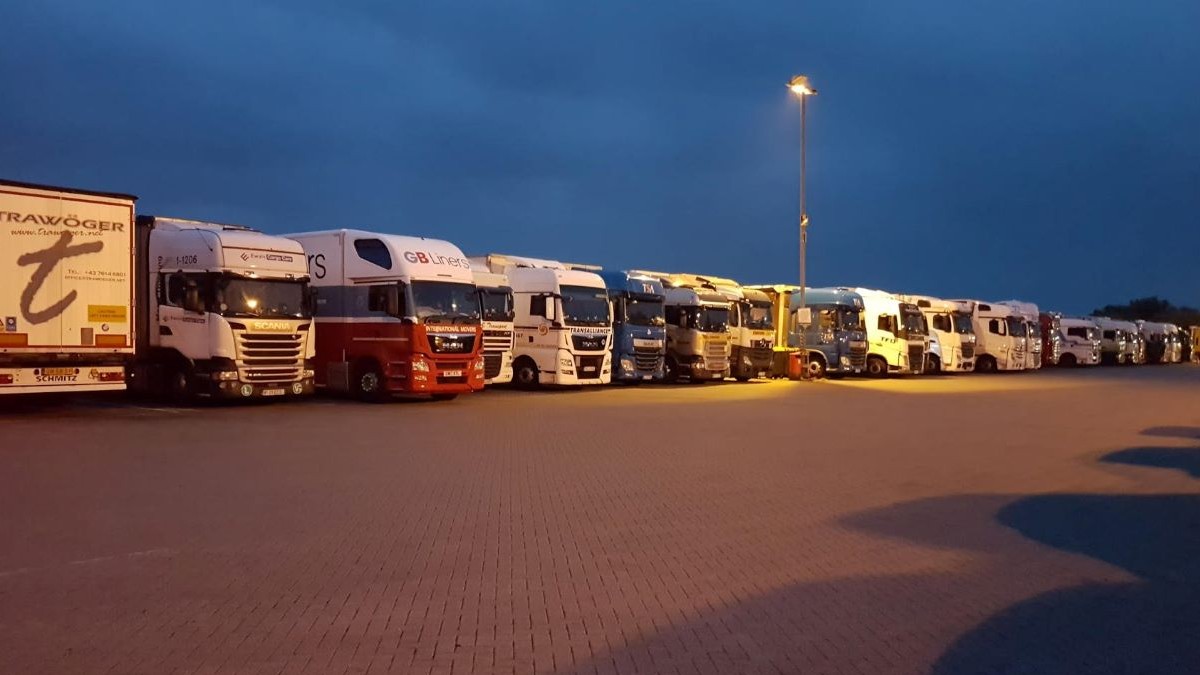
bp’s EV charging brand, bp pulse, will electrify one of Europe’s largest and busiest truck stops to power up electric heavy goods vehicles (HGVs).
Ashford International Truckstop is in Kent, England. The 21-acre Ashford International Truckstop currently offers 660 parking bays and convenience services for HGV drivers, and it’s got restaurants, shops, bars, and a gym.
It’s close to Dover, the UK’s busiest ferry port, and LeShuttle Freight via the Eurotunnel terminal in Folkestone. Around 3.5 million HGVs travel across the English Channel via the port of Dover and Eurotunnel annually.
So bp pulse’s acquisition and plan to electrify the vital truck stop will position it to better meet the needs of UK and European HGV operators transitioning to EVs.
Stefan von Dobschuetz, general manager bp pulse Europe, said:
For fleet operators to consider going electric, they must be confident that the infrastructure is in place to support them.
That is why we are thrilled to have secured the land to a crucial site near Dover as we strive to meet the evolving needs of HGV operators transitioning to EVs.
We look forward to working with national energy infrastructure partners to facilitate timely power connections for our ambitious project.
bp pulse could install EV chargers that are suitable for both fast charging and overnight charging.
The company says Ashford International Truckstop has the capacity to host around 20 megawatt chargers, 10 x 400 kW chargers, and 125 x 100 kW chargers, depending on power connection availability and how quickly the road freight sector electrifies.
A megawatt charger has the potential to fully charge an HGV in up to 45 minutes, enabling an onward range of 310 miles (500km) in a single charge, depending on conditions.
bp pulse will lease back the site to Ashford International Truckstop, which is currently owned by real estate firm GSE Group, to operate the existing site facilities and secure parking. bp pulse will operate and manage the EV charging infrastructure.
bp pulse’s bigger-picture plan
In 2022, bp pulse announced it would invest up to £1 billion in the UK’s EV charging infrastructure and up to €100 million in Germany’s EV charging infrastructure by 2030.
In January 2023, bp launched Europe’s first truck charging corridor along a 600 km (373-mile) stretch of the Rhine-Alpine corridor across Germany. bp has 21 operational Aral pulse (bp’s brand in Germany) EV truck stops in Germany. That enables an electric truck to cover over 750 km (466 miles) across multiple routes throughout Germany.
The first megawatt chargers are expected to be in place at Ashford from 2026. Once they’re online, it will establish a link between the UK and German charging corridor to encourage HGV operators further to shift to electric.
Read more: Daimler, Volvo, Navistar form a ‘supergroup’ to ramp up electric truck charging infrastructure
If you live in an area that has frequent natural disaster events, and are interested in making your home more resilient to power outages, consider going solar and adding a battery storage system. To make sure you find a trusted, reliable solar installer near you that offers competitive pricing, check out EnergySage, a free service that makes it easy for you to go solar. They have hundreds of pre-vetted solar installers competing for your business, ensuring you get high quality solutions and save 20-30% compared to going it alone. Plus, it’s free to use and you won’t get sales calls until you select an installer and share your phone number with them.
Your personalized solar quotes are easy to compare online and you’ll get access to unbiased Energy Advisers to help you every step of the way. Get started here. –ad*
